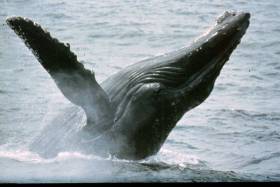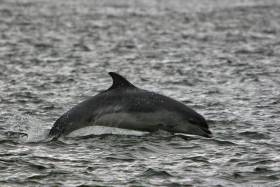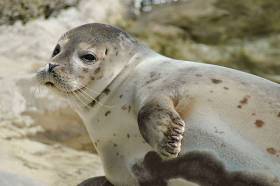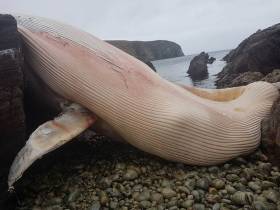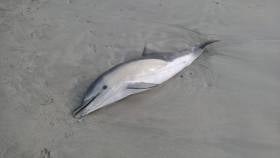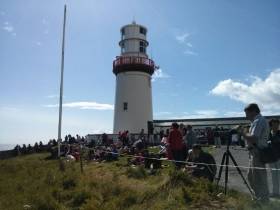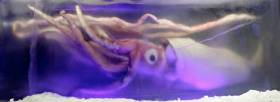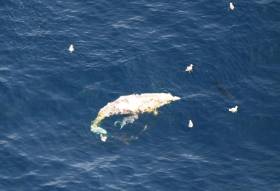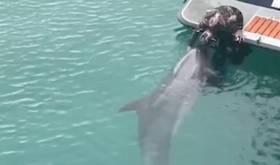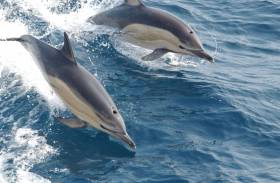Displaying items by tag: IWDG
#Lecture - The Friends of Glenua first 2018 lecture entilted ‘Whales & Dolphins in Ireland’ Current Knowledge & New Discoveries is to be presented by Dr. Simon Berrow, next Thursday 11 January.
As usual the lecture programme is held in the Poolbeg Yacht & Boat Club, Ringsend, Dublin 4 with the talk beginning at 20.00. There will be an entry €5 in aid of the RNLI.
Dr Simon Berrow was a founder member of the Irish Whale and Dolphin Group and is currently their Head of Science. He is also a full time lecturer at the Galway-Mayo Institute of Technology, teaching on the Applied Freshwater and Marine Biology degree and runs the long-term Shannon Dolphin Study on Bottlenose dolphins in the Shannon Estuary.
Simon has worked on whales and dolphins since 1989, largely in Ireland, but is also involved in a humpback whale study in Cape Verde and spent 2.5 years on South Georgia with the British Antarctic Survey.
In his talk, Simon will introduce the rich community of whales, dolphins and porpoises in Ireland to the audience. He will share some the findings of new studies on whales and dolphins in Ireland from inshore to offshore waters, from coastal to deep-diving species. Also he will discuss what we need to find out in order to conserve these magnificent creatures.
Marine Wildlife Groups Share In €2.5M Funding For Animal Welfare
#MarineWildlife - Four marine wildlife organisations will share in €2.56 million in funding for animal welfare throughout the State, as announced yesterday by Marine Minister Michael Creed.
Seal Rescue Ireland in Courtown, Co Wexford receives €12,000 for its efforts in rehabilitating seals and other marine wildlife, as well as providing training for rescuers across the country.
In other awards, Galway & Claddagh Swan Rescue in Barna has been allocated €5,000, while the Irish Whale and Dolphin Group receives €3,000, and the Oiled Wildlife Response Network, based at Shannon Foynes Port, will get €1,000.
“These bodies provide a great service to the community in their work in safeguarding animals,” said Minister Creed of the awards for 111 animal welfare groups.
“Many of today’s recipients provide facilities for neglected animals that sadly in a large number of instances have been abandoned by irresponsible owners, and the increased funding being awarded is evidence of my department’s ongoing commitment in protecting animal welfare and a recognition of the important role played by the many organisations throughout the country in safeguarding animals, particularly pet and companion animals.”
Seals Released Off North Coast After Extended Exploris Stay
#MarineWildlife - Two common seals were released off the North Coast last week after being nursed back to health at the Exploris aquarium in Portaferry.
According to The Irish News, the seals named Hans and Albert had been with the sanctuary since the summer, when they arrived with various injuries.
However, by September both had put on weight and were eating by themselves, prompting Exploris staff to plan for their eventual release at Ballintoy Harbour last Wednesday (29 November).
In a techy twist, Hans and Albert have been microchipped so their progress can be monitored from shore over the next few weeks and months.
Also in the care of Exploris staff is a baby seal rescued from a rocky outcrop off Bangor in Belfast Lough in late October.
BBC News has video of the tiny white seal pup, which was suspected to have an injured hip and damaged flipper likely suffered during Storm Ophelia.
Another presumed victim of the stormy weather was a seal recovered from Dun Laoghaire’s East Pier on Hallowe’en.
The Irish Times reports that the marine mammal had sustained injuries to its face and rear flipper, but was said to be doing well in the care of volunteers from the Courtown Seal Rescue Centre in Co Wexford.
More recently, a number of stranded dolphins were successfully returned to the water off Achill Island by locals and volunteers on Tuesday 21 November.
Four common dolphins were reflected from Keem Beach, though a fifth was found dead on nearby rocks. The Irish Whale and Dolphin Group (IWDG) removed the carcass to determine its cause of death, as the Mayo News reports.
Back on the North Coast, BelfastLive says a six-metre whale carcass surprised locals at Runkerry Strand near Portballintrae on 24 November.
The find came just weeks after a much larger fin whale carcass was found on Arranmore off the Donegal coast, as previously reported on Afloat.ie.
Fin Whale Carcass Surprises Donegal Island Residents
#MarineWildlife - Residents on Arranmore off the Donegal coast were surprised to find a rare whale carcass washed up on their island over the weekend.
According to BBC News, the 20-metre cetacean is believed to be a fin whale, an endangered species not normally spotted so close to Irish shores.
Though photo opportunities may be tempting, the public has been urged to stay away from the carcass for health and safety reasons.
Fin whales are sometimes spotted offshore, says Dave Wall of the Irish Whale and Dolphin Group (IWDG), who added that this whale was likely dead for some time before its carcass beached.
It’s not known what causes the fin whale’s death. But marine debris — especially microbeads from bathroom products – is a growing threat to all whales, dolphins and porpoise in Irish waters, as the IWDG recently reported.
Citing a new study that found marine debris (such as plastic bags and fish hooks) in the digestive tracts of 8.5% of cetaceans examined, the IWDG highlights that micro-plastics were present in the guts of every animal in the study.
“While larger marine debris has been shown to cause impaction of the gut and other complications which can lead to death, the impact of micro-plastic contamination is not known,” says the group.
“It is thought it can act as a vehicle for persistent pollutants, which adhere to the large surface area resulting in a potential increase in contaminant burdens in marine mammals.”
The IWDG has more on the study HERE.
IWDG Marks Another ‘Record’ Year For Cetacean Strandings
#MarineWildlife - The Irish Whale and Dolphin Group (IWDG) has expressed its dismay at another record year for cetacean standings around the Irish coast.
The first eight months of 2017 alone have seen 201 recorded strandings - up 30% compared to the same period in the last two years.
“As in recent years, the numbers of dead common dolphins recorded are very high, with 78 records for this species to the end of August 2017 accounting for 39% of all strandings,” says IWDG strandings officer Mick O’Connell, who notes that the numbers of dead dolphins washing ashore in late winter and spring has grown unusually high.
“Even in a series of years with particularly high numbers of this species stranding since 2011, 2017 is well ahead of the previous two ‘record’ years by the end of August — 66 in 2016 and 53 in 2013.
“These are, of course, minimum numbers as we don't know how many dead animals go unrecorded and also many unidentified dolphins which aren't identifiable to species level are likely to be common dolphins,” he adds.
The IWDG is currently working with the Marine Institute, Department of Agriculture and National Parks and Wildlife service on a post-mortem scheme for common dolphins, striped dolphins and harbour porpoises which is hoped will shed new light on what might be causing this alarming rise in cetacean deaths.
Meanwhile, there was more positive news from the recent all-Ireland whale watch at the end of August, where three-quarters of the 20 sites around the island recorded sightings.
Around 1,300 whale watchers and wildlife enthusiasts spotted eight species of cetacean between them — with the busiest site at Loop Head in Co Kerry, where 120 lucky visitors got to see two humpback whales, five minke whales, six bottlenose and a whopping 50 common dolphins.
Other marine wildlife species spotted around the coast included Risso’s dolphins, blue fin tuna, ocean sunfish and grey seals.
More recently, the IWDG’s Celtic Mist embarked on a week-long survey of the waters around North and West Kerry, and its crew shared a video of some of their sightings.
Look To The Sea On All-Ireland Whale Watch Day Later This Month
#MarineWildlife - 2017’s All–Ireland Whale Watch Day is scheduled for Saturday 26 August between 2pm and 5pm as part of Heritage Week.
Join the Irish Whale and Dolphin Group (IWDG) at any of 20 land-based whale watches across Ireland to celebrate the 26th Anniversary of Irish waters being declared a sanctuary for whales and dolphins and find out about the 25 species of cetaceans – porpoises, dolphins and whales – recorded to date around the coast.
All watches are land-based and will be led by experienced IWDG researchers, enthusiasts and whale watchers who will show you how to observe and identify some of the more commonly-recorded cetacean species seen in Irish waters.
The event also provides IWDG researchers with a unique snapshot of whale and dolphin activity around the Irish coast on the same day.
Please bring binoculars or a spotting scope if you have them and dress appropriately for outdoor conditions. There are no boat trips involved and there is, of course, no guarantee that you will see whales or dolphins at your chosen site – but at last year’s event, whales or dolphins were recorded at 15 of 20 sites.
So if the weather is suitable on the day, you’ve quite a good chance of seeing some really interesting marine wildlife. And in the process, you’ll be supporting whale and dolphin conservation in Ireland.
The full list of watching locations, with watch leader contacts, is as follows:
- Clogherhead, Co Louth - Port Oriel Upper Car Park - Breffni Martin 087 9145363
- Howth Head, North Dublin - Balscadden Car Park - Conal O’Flanagan 086 3537900
- Killiney Bay, South Dublin - Vico Road - Isabel Baker 086 4057633
- Bray Head, Co Wicklow - Pitch & Putt Car Park - Justin Ivory 087 6833898
- Wicklow Town - Black Castle Car Park - Brian Glanville 087 1390665
- Hook Head, Co Wexford - Hook Head Lighthouse - Harm Deenen 086 3485013
- Ardmore Head, Co Waterford - Ram Head Signal Tower - Andrew Malcolm 087 7952061
- Galley Head, Co Cork - Lighthouse - Pádraig Whooley 086 3850568
- Lehanemore, Beara, Co Cork - Lehanemore Community Centre - Patrick Lyne 027 71930
- Valentia Island, Co Kerry - Bray Head Signal Tower - Sean O’Callaghan 085 7764918
- Clogher Head, Co Kerry - Layby - Nick Massett 087 6736341
- Loop Head, Co Clare - Loop Head Lighthouse - Simon Berrow 086 8545450
- Black Head, Co Clare - Black Head Lighthouse - Sandra O’Donovan 086 6061869
- Downpatrick Head, Co Mayo - Car Park - Aoife Foley 085 8276984
- Mullaghmore Head, Co Sligo - Mullaghmore Layby - Miriam Crowley 087 6171377
- Bloody Foreland, Co Donegal - Foreland Heights Car Park - Gareth Doherty 086 2223328
- Inishowen Head, Co Donegal - Tower - Trish Murphy 087 6748183)
- Portstewart Head, Co Derry - Car Park - Jim Allen 078 76516032
- Portmuck, Co Antrim - Car Park - Ian Enlander 028 93372724
- Bloody Bridge, Co Down - Car Park - Dave Wall 077 71762355
Kerry Trawler Lands Second Giant Squid In As Many Months
#MarineWildlife - Once was exciting enough — but a Kerry trawler had landed a second giant squid in as many months, as RTÉ News reports.
Local fisherman Pete Flannery landed what was the first giant squid recorded in Irish waters for 22 years in mid May, as previously reported on Afloat.ie.
But amazingly, he had repeated the feat this month while trawling in the same area, on the Porcupine Bank west of Dingle.
Before this year, only five of the enormous cephalopods had been found in Irish waters since records began in 1673.
What’s more, two of those squid were landed by Flannery’s own father Michael back in 1995.
“I'll probably have to catch a third now so that I can have bragging rights,” Flannery told RTÉ News, which has more on the story HERE.
Another Giant Squid landed in Dingle. Only 7th recorded in Ireland in 350 years. Amazingly 4 have been caught by Flannery family! @rtenews pic.twitter.com/1gWBYZr045
— Seán Mac an tSíthigh (@Buailtin) July 18, 2017
Elsewhere, a Galway man recorded video of a killer whale carcass washed up on the shore near Roundstone in Connemara.
Independent.ie reports that the orca sighting was confirmed by the Irish Whale and Dolphin Group, whose Mick O’Connell said the species is “neither common nor very rare [but] you wouldn’t see then very often.”
Ireland’s North Coast is a regular haunt for an “evolutionary significant” pod of killer whales that has been under threat for years due to its lack of young.
Ireland’s Whale Watching Season Is Expanding Says IWDG
#MarineWildlife - The Irish Whale and Dolphin Group’s Pádraig Whooley says he has “lost count” of the number of minke whales seen off West Cork in recent days, as The Irish Times reports.
Whales of various cetacean species are now arriving in Ireland in larger numbers much earlier in the year than their usual appearance in autumn, according to the IWDG’s sightings co-ordinator.
Minke whale numbers between Union Hall and Galley Head have been “exceptional” since last week, says Whooley — who also notes that a pod of humpbacks familiar to West Kerry coastal residents has been feeding off Cork over the past fortnight, while the whale known as Boomerang has been spotted off Waterford.
Elsewhere, the Air Corps Maritime Squadron recently captured some astonishing images of sharks feeding on a whale carcass some 200km northwest of Donegal.
“It's not often that we get sent such clear images of a dead cetacean being scavenged on by several sharks,” said IWDG standings officer Mick O'Connell, “but it does give an indication of the importance of dead animals in the food chain.”
Dusty The Dolphin Makes A Friend At Inis Oírr
#MarineWildlife - Dusty the dolphin earned a measure of infamy in previous years after attacking a number of bathers at her former home in Doolin.
But the Wild Atlantic Way’s other resident bottlenose – after Dingle's celebrated Fungie – was in a much more agreeable mood in recent days, as a new video captured by visitor Elaine Farrell shows her adorable encounter with a snorkeller at Inis Oírr.
Dusty appears perfectly calm as she rolls over in the water for a belly rub from the diver, who was perched at the stern of a boat moored in the Aran Islands harbour.
However, as cute as that encounter might be, the Irish Whale and Dolphin Group’s Dr Simon Berrow warns that Dusty and other dolphins like her are still wild animals — and getting close to them can be dangerous.
“Our advice would be: don’t swim with the dolphins,” he said, adding: “Respect their distance and don’t do anything stupid. It’s hard to know what will set off aggressive behaviour.”
Elsewhere, video from the Copeland Islands off Donagahdee show a lazy seal taking it easy on a dinghy moored off the Irish coast recently.
Coastline Comes Alive For National Biodiversity Week
#MarineWildlife - Whether you’re cruising around the coast or staying put on dry land, there’s much to see and explore during National Biodiversity Week, which kicked off yesterday (Friday 19 May) and continues till next weekend.
Among the 50 free events nationwide are two whale watches hosted by the Irish Whale and Dolphin Group (IWDG), today (Saturday 20 May) at Cloghna Head in Co Cork and next Sunday (28 May) at Loop Head in Co Clare.
The IWDG is also holding talks on Ireland’s cetaceans — no doubt with reports from the latest Celtic Mist cruise — in Fenit, Co Kerry (on Sunday 21 May) and Kilrush, Co Clare (Saturday 27 May), the latter of which will discuss the unique population of Shannon dolphins.
Next Saturday also sees Galway Bay seashore walks at Grattan Shore in Salthill, in association with Galway Atlantaquaria, to explore the area’s marine wildlife.
Coast Monkey lists its top picks from the week’s activities, including a nature walk on Inch Beach tomorrow (Sunday 21 May), rock pool exploration at Hook Head Lighthouse (Sunday 28 May) and a biodiversity walk at the Wicklow Murrough (Friday 26 May) led by marine biologist Karin Dubsky.



























